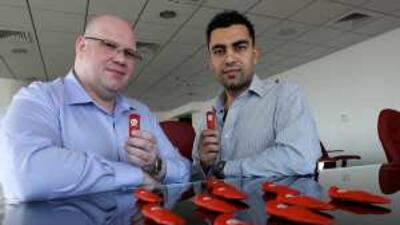DUBAI // Two years ago, Ahmad Zahran was desperate to watch a movie. The trouble was, he wanted to watch it on his television and the files were stored on his laptop.
He set out to solve the problem. By the time he was finished, he had become both an inventor and a hi-tech entrepreneur. On Monday, Infinitec, his Dubai-based start-up company, will unveil the first USB device with so-called infinite memory. It is a gadget that is already attracting worldwide attention among tech-savvy consumers. Called an IUM for Infinite USB Memory device the stick will cost less than US$150 (Dh550).
Mr Zahran, 31, hopes that one day it will be as commonplace as the typical memory stick most people now use to transfer files. He recalled his moment of inspiration. "What I did was try to get my movies and TV shows to play on my TV, and so the first thing I did was buy DVDs and burn them. But then I ended up with a stack of DVDs," he said. "Then I tried to set up a home network and spent thousands of dirhams.
"I thought, 'Why can I not just stream things directly from my laptop to something with a USB port?' That's when I thought about how that would work. And before I knew it, I came up with the specifications." The device looks like any other memory stick but acts as a wireless connector between a personal computer and anything that is USB-enabled: a laptop, DVD player, gaming system or stereo. Using wireless technology, the host computer must be switched on and be no more than 30 metres from the receiving device, when indoors, and 100 metres outdoors.
An internet connection is not required to transfer files unless a user wants to watch something that is being streamed online. Mr Zahran, a Palestinian, was born in Saudi Arabia and grew up in Spain. He has lived in Dubai for 13 years. To make his idea a reality, he collaborated with an Australian, David McKern, 32, who was a colleague at Nokia, where they both worked as regional sales managers. Mr Zahran had the expertise to take his idea from inspiration to execution. He has a bachelor's degree from American University of Sharjah in Electrical and Electronics Engineering and a master's in Systems Science from Carleton University in Ottawa.
"From the day I started, I knew I had something unique," he said. The device is pre-loaded with software that is downloaded on to the computer to enable a file transfer. "Think of it as a cable from a laptop to any USB port," he said. "It's only that the 'cable' is wireless." It is described as having infinite memory because it can transfer an unlimited number of files from a personal computer to another source. Once visible on the second device, the files be they photos, music or movies can be saved.
"You actually don't save stuff on this stick," said Mr Zahran. "It links back to the host laptop and uses it as its own memory." He expects that the first few thousand sticks he sells will be bought by tech-adept consumers. "Those people are already raving about the product," he said. "When it stops becoming a new technology and starts becoming usual, everyone will start buying it." The stick is the first product to be launched by Infinitec, still a two-man company. The product is manufactured in Malaysia and Singapore.
"I would have liked it to have been made in the UAE," Mr Zahran said, "I would have loved that. But the UAE doesn't have the ability to manufacture [this kind of] new technology. "The hardware is so new that very few manufacturing plants around the world can do this. Dubai doesn't have any, let alone plants of that calibre. We contacted several manufacturers around the world. All of the software is created in-house, so that is localised."
Infinitec is in the process of setting up worldwide distribution. Mr Zahran thinks he is making history. "We are the first Arab company to develop and export technology on a global scale," he said. "We had no investor backing so we had to be very creative as to where we got the money to develop the product from. It's mainly all of my savings and a bunch of other people's savings." He knows he is embracing risk.
"I don't really think it's not going to do well," he said. "I did think about failure very early on and asked myself if this was something I was willing to go bankrupt over. And the answer was yes. "But now I am more than 100 per cent sure that this is going to work. People are going to want it." He said Infinitec planned to launch seven more projects but declined to go into specifics. The Middle East, he said, is behind the curve in supporting IT companies. "People don't understand the need to develop technology in the Arab world. They would still rather invest in real estate than in a firm like ours."
asafdar@thenational.ae
Sharing filesLend your IUM to a friend and use your laptop software to give him access to whatever files you want to copy over. Watching movies Stream films directly to a television screen by sharing your video collection on your IUM. It works for HD, too. Playing video games Stream media files from your laptop straight on to the console. Listening to music If you want to blast your favourite playlist on your stereo but don't want to burn a CD or connect an MP3 player, use the IUM to load the music on an external system. Viewing photos on digital frames Plug the IUM into a photo frame, choose the pictures, mark them as shared and they are immediately on display. Project a presentationGo to a meeting, connect the IUM to the projector, choose the presentation to display and it instantly appears on the screen.

